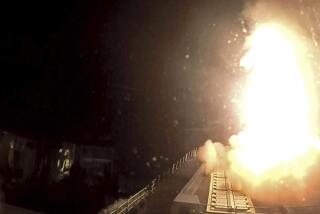Venezuelan Strike Tightens Global Taps
- Share via
WASHINGTON — Three weeks of strikes in Venezuela have choked off a key source of oil needed to offset any loss of production in the Middle East, raising the stakes for any military action in Iraq, industry officials and analysts say.
Most experts predict the public uprising against Venezuelan President Hugo Chavez will end before the United States would be ready to wage war. But the mere possibility of overlapping crises is roiling energy markets, creating new risks for the economy and adding another element of uncertainty to events unfolding in the Persian Gulf.
“It becomes much more risky” to invade Iraq, said John Lichtblau, chairman of the Petroleum Industry Research Foundation in New York. “It definitely was not part of the administration’s plan to do this with one of its major foreign oil suppliers being inoperative.”
“We are very concerned,” Secretary of State Colin L. Powell said last week. “We ... are very worried about the fact that the oil sector is slowly shutting down, with economic consequences for all Venezuelans as well as others outside Venezuela.”
The Bush administration has had little to say publicly about the effect of the Venezuela crisis on its Iraq planning. A senior State Department official said U.S. officials do not anticipate a sustained loss of Iraqi oil in the event of war and believe production can be ramped up relatively quickly.
“Going to war will affect oil markets, but it won’t have a long-term dramatic effect,” the official said.
Few experts say that the Venezuela predicament is likely to alter the timetable of an Iraq offensive. But oil analysts and industry insiders said the turmoil is being taken into account as the administration proceeds with its planning.
“I’ve had two conversations today with people from the government, and that was the subject, Venezuela and Iraq,” said one industry official. “It complicates it, no question about it.”
The combination of the Venezuela strike and Middle East jitters has already driven the price of oil above $30 a barrel, close to a two-year high. Some analysts expect the higher prices to stick.
Goldman Sachs predicted last week that oil prices will average more than $30 a barrel during the first half of 2003, even if the Venezuelan strike ends in two weeks and the U.S. government releases oil from the Strategic Petroleum Reserve. Prices would rise even higher in the event of war in Iraq, an unusually cold winter or no SPR drawdown, the investment firm said.
Higher oil prices would cause the U.S. economy to slow and the unemployment rate to rise, Goldman analysts warned. If war in Iraq pushed oil prices above $40 for a sustained period, another recession might be in the cards.
“We’re certainly nervous about it,” said Goldman Sachs’ chief U.S. economist, William Dudley. “It’s going to lead to a short-term supply shortfall over the next few weeks. So the margin for safety if there is war in Iraq is very much diminished, and the risk of an oil price shock has gone up. One could imagine oil price spikes above $40 a barrel.”
The combined effect of the strike in Venezuela, nuclear power shortfalls in Japan and the recent cold snap in the U.S. has created a “perfect storm” capable of pushing prices substantially higher, said Deutsche Bank global oil strategist Adam Sieminski.
“The longer it goes on, the worse it’s going to get until you have some of that production being made up by Saudi Arabia and a couple of other OPEC countries with spare capacity,” Sieminski said.
The strike by Venezuelan oil producers, refiners and shippers has virtually shut down production in what the most recent U.S. government data show is America’s fourth-largest source of imported oil, behind Saudi Arabia, Mexico and Canada.
“This is a country that has been regarded as a reliable exporter since the Second World War. It’s been one of the bedrocks of U.S. energy security,” said Daniel Yergin, oil historian and chairman of Cambridge Energy Research Associates. “Replacing Venezuela eats up a significant part of the security margin of additional supplies that can be brought into the market.”
Venezuela has been providing 9% of the crude oil consumed in this country. Since the strike began in early December, production has fallen from nearly 3 million barrels a day to fewer than 500,000.
“It’s already a serious disruption,” said Edward Morse, special advisor to Hess Energy Trading Co. in New York. “The world has lost at least 35 million barrels of oil already. The chances are we will lose at least another 25 million barrels.”
Even if the strike ended tomorrow, it would take about eight weeks to fully restore production. For each additional day the situation goes unresolved, nearly 3 million barrels are subtracted from global oil supplies. The world uses 77 million barrels a day.
Morse said the loss of Venezuelan production, by itself, is not enough to create lines at U.S. gas stations. But it is sufficient to keep oil prices high.
“It’s taking place in the wintertime, when global demand is peak, with the coldest winter we’ve had in three years and with commercial stocks at a historically low level,” he said.
Some analysts predict the shortfall will soon force U.S. officials to tap the nation’s Strategic Petroleum Reserve. That in turn would reduce slightly the amount of stockpiled oil available to offset any loss of production from Iraq or its neighbors.
The government has already suspended scheduled deliveries to the SPR so more oil will be available in the spot market. But so far, it has rejected appeals from oil companies to release any of the 599 million barrels of crude currently stored in salt caverns beneath the coasts of Texas and Louisiana.
Saudi Arabia and other members of the Organization of Petroleum Exporting Countries have promised to boost production to offset any sustained shortfalls caused by events in Venezuela or Iraq. But they have also warned that it will be difficult to make up the difference if production is curtailed in several countries simultaneously.
Algerian Oil Minister Chekib Khalil, speaking to reporters Friday before a meeting of Arab oil exporters in Cairo, said “a worsening situation is to be feared” because of Venezuela, Agence France-Presse reported.
While many analysts and officials are betting the strike will end before an Iraq campaign begins, some cited the possibility of Iraqi President Saddam Hussein halting oil exports ahead of schedule in an effort to inflict havoc on world markets while Venezuela’s wells remain shut down.
Although events in Iraq have received more attention, the situation in Venezuela could have a bigger effect on oil markets, analysts said. Venezuela produces more oil than Iraq.
In addition, it takes only about a week to ship oil to the United States from Venezuela but nearly six weeks to make the same trip from the Middle East.
*
Staff writer Robin Wright contributed to this report.
More to Read
Sign up for Essential California
The most important California stories and recommendations in your inbox every morning.
You may occasionally receive promotional content from the Los Angeles Times.










